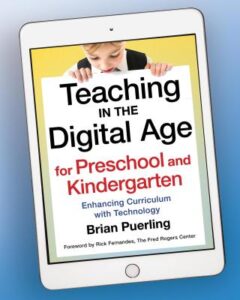Technology Resources for Families of Young Children
This topical guide will introduce you to important books, videos, and information resources available from the EI Clearinghouse and other sources. Contact us via online form or by phone (1-877-275-3227) to request a resource listed below (or ask your local public librarian). Note that some videos may be viewed online, and journal titles will take you to the publisher’s homepage.
Table of Contents

EIC Resources
Books
This book provides 52 strategies – one for every week of the year – to help caregivers stimulate healthy brain growth in young children.
In this book, Temple Grandin creates a blueprint for different ways to look at the world. And more than a call to action, she gives a call to imagination, and shows readers that there is truly no single way to approach any given problem–but that an open and inquisitive mind is always key.
This book helps teachers create a more well-rounded STEM learning program by: encouraging children to think, make, tinker and innovate, introducing engineering skills such as coding in a developmentally appropriate way, leveraging children’s use of digital technologies to help them learn new skills, and promoting active engagement and participation in classroom learning.
This book will help caregivers evaluate the tools and opportunities technology has to offer and integrate them into early childhood experiences.
This book offers a refreshingly positive framework for preparing kids to be successful in a digital world and effective digital citizens.
This book is a collection of screen-free, traditional games and activities for young children that require nothing more than people and their brains to play. All games and activities are adaptable according to the age of the children, their interests, and their abilities.
This book provides concrete examples of how to integrate readily available technologies that can easily support young children’s learning.
Infants and toddlers learn through investigating, discovering, and experimenting with their surroundings. This book provides ideas to inspire safe loose parts play with your infants and toddlers.
Ollie has a big imagination and big plans for summer. But no one in his family wants to go outside and play. How can Ollie get his family to shut off their gadgets and play together?
This book shares ways to: optimize and balance different types of play to deepen regular classroom learning, teach into play to foster social-emotional skills and a growth mindset, bring the impact of play into all your lessons across the day.
This book is packed with at-home discussion topics and enjoyable activities that any busy family can slip into their daily routine. Full of practical tips grounded in academic research and hands-on experience, this book gives parents a guide to raising digital kids who will become the positive and successful leaders our world so desperately needs.
Screen-Free Fun offers over 400 ideas to disconnect from tech devices and reconnect with our families in a healthier way. This book has 400 ways to have fun as a family: DIY projects, outdoor adventures, easy daytrips, etc. are all examples of possible activities in this book.
This book gives educators and parents the tools and information they need to help children grow into strong, passionate readers who are skilled at using media and technology of all kinds—print, digital, and everything in between.

This book will guide teachers toward integrating technology so it has an authentic, meaningful, and developmentally appropriate impact on children’s exploration and learning.
This book offers early childhood teacher educators, professional development providers, and early childhood educators in pre-service, in-service, and continuing education settings a thought-provoking guide to effective, appropriate, and intentional use of technology with young children.
Making sense of the complex issues associated with screen media in the lives of children under 3 can be challenging for the adults who care for them. This book, focused specifically on infants and toddlers, explores why and how infant and toddler caregivers need to be techwise in order to understand the implications of screen media for children’s learning and development.
This book offers insights and advice that can help parents achieve greater understanding, authority, and confidence as they come up against the tech revolution and how families can combat the disconnection we are experiencing from our extreme device dependence.
This book reveals the histories behind the human-made elements in our child’s landscape, showing how those elements affect kids’ behavior, values, and health.
Videos and Media
This video discusses implications of technology use as an early learning tool for young children with and without disabilities.
This video discusses implications of technology use as an early learning tool for young children with and without disabilities.
This video discusses implications of technology use as an early learning tool for young children with and without disabilities.
Organizations
No resources have been added to this section yet. However, new resources are added frequently!Articles
This position statement examines the potential benefits and risks of screen media in children younger than 5 years, focusing on developmental, psychosocial and physical health.
This article provides insight into using technology to communicate with parents in the early childhood setting. The author discusses the benefits and limitations of technology and the importance of the face-to-face relationship.
Web Resources
Media in all forms, including TV, computers, and smartphones can affect how children feel, learn, think, and behave. The American Academy of Pediatrics (AAP) encourages you to help your children develop healthy media use habits early on.
These tools are designed to help pediatricians and health professionals understand and implement the AAP recommendations on children and media, and to discuss the topic with parents and families.

